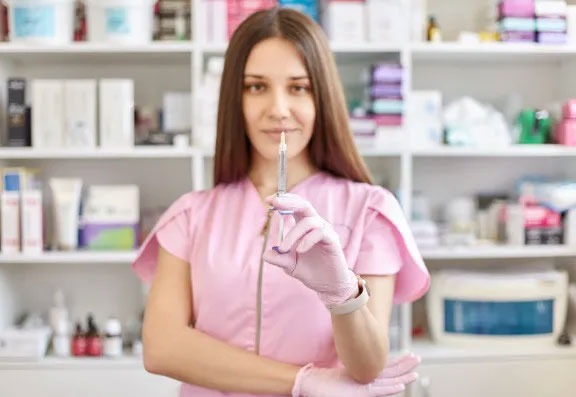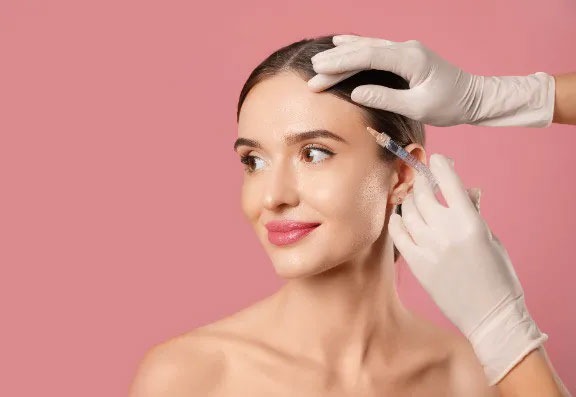There are plenty of places offering cosmetic injections and medical treatments these days so it can be difficult to know who to trust. There's also a significant lack of regulation governing who can offer treatments which doesn't help!
To help you make safe decisions, we outline our top tips of things to consider before booking Botox with a trained medical professional...
Botox is a brand name for botulinum toxin. Other brands available in the UK include Bocouture, Azzalure, Letybo and Nuceiva
Although Botox is a non-surgical treatment generally used for cosmetic concerns, it is a prescription-only medicine. This means you will only be able to undergo treatment if a qualified medical prescriber has reviewed your aesthetic concerns and prescribed the botulinum toxin to you in person.
Doctors and dentists are prescribers, while nurses, pharmacists and some other healthcare professionals can undergo additional training to become qualified prescribers. Of course, it is also essential that they have had training specifically in the use of botulinum toxin.
Remote prescribing is illegal; this means prescriptions can only be provided if the prescriber has reviewed the patient in a face-to-face consultation. They should not prescribe Botox after a phone or video consultation.
In the UK, there are no specific qualification requirements needed to administer botulinum toxin treatments. This means, as long as it is prescribed by a qualified prescriber who will be held accountable for the treatment, anyone can perform injectable treatment.
In some circumstances, this is fine; for example, a qualified prescriber such as an experienced doctor, dentist, or nurse prescriber could prescribe the toxin to a patient, who is then treated by a medical practitioner in the same clinic. The prescriber will have physically reviewed the patient and is nearby to help out if necessary.
As mentioned above, it's not okay for someone to carry out the treatment if their patient has not been reviewed in person by a prescriber.
Can Non-medics Inject Botox?
Unfortunately, there is currently no law stopping non-medics from carrying out treatment if the patient has been prescribed Botox, Bocouture, Azzalure or another brand of botulinum toxin by a qualified prescriber.
However, medical professionals will have had detailed anatomy training so will know exactly where it is safe to inject the product.
They should also know how to handle a complication and prescribe relevant emergency medications in case of serious complications.

We highly recommend that you only undergo injectable treatment (Botox or dermal fillers) with a medically-qualified trained professional, who will have undergone training in facial anatomy and physiology, as well as being accountable to a regulatory body such as the General Medical Council (GMC), Nursing and Midwifery Council (NMC) or General Dental Council (GDC).
They should also be able to advise you of the risks of injectable treatment and be confident in handling serious complications if they arise.
When selecting a medical practitioner to inject your botulinum toxin, it's important to keep these things in mind:
Does your injector have a medical background?
Does your injector offer face-to-face consultations where you can discuss your medical history and treatment plan?
Is the practitioner properly trained in cosmetic procedures; specifically botulinum toxin injections?
Are they an experienced injector? (Experience counts with injectables!)
Do they have experience in complication management?
Does the injector belong to an organisation that has strict guidelines and standards of care for its members?
Have they got good recommendations for their aesthetic treatments?

How to Tell if Your Practitioner Is Properly Trained
Ask to see their medical accreditations
Ask to see their training certificate(s) and proof of continuing education credits
Ask what type of training they have received, specifically in botulinum toxin procedures. If they say that they trained at the local beauty school or from a friend, this is not sufficient; proper training involves an accredited programme with extensive instruction and supervised clinical experience under an experienced medical injector.
Any experienced and appropriately qualified injector will be happy to show you relevant documents at your face-to-face consultation.
Checking the Qualifications of a Practitioner
All doctors, dentists and registered nurses should be able to provide you with a copy of their:
Qualifications
Insurance
License
Certificate of registration with the relevant government authority (i.e., the NMC, GDC or the GMC)
Don’t Shop for Botox by Price Alone
If you’re looking to save money on botulinum toxin, the best way to do it is by not shopping based on price alone. Often the cheapest treatment will actually be less effective than a more expensive one.
A lot of things go into determining how much a certain dose of botulinum toxin costs: what kind of product you have, where it comes from and how much time it takes for them to use it all up.
But, bear in mind, just because someone has a lower price than another practitioner, it doesn’t mean they aren’t using high-quality products. Price can often be dependent on the location you are seeking treatment in.

Don’t Shop for Botox by Price Alone
Here are some signs that should raise questions about whether or not you should trust a medical injector to administer botulinum toxin:
If they are not willing to answer any questions and/or cannot provide answers in an informed, professional manner
If they do not have a license to practice medicine in your country
If they are using a remote-prescribing service instead of ensuring the prescriber sees you in real life
If they do not explain the risk associated with the procedure
If online reviews are negative, especially if someone reports having complications after treatment with this practitioner (complications such as drooping eyelids)
Book Your Botox Consultation Today.
As you will have learnt, botulinum toxin (Botox, Bocouture, Azzalure, Letybo and Nuceiva) is a great tool to help you look younger and fresher. It’s important that you get treated by an experienced, medically trained, and qualified practitioner who will inject you safely.
As always, if you have any questions you can use our Botox Q&A where you can ask for more advice direct from a trusted, experienced medical practitioner.
Belotero vs. Juvederm: They are two of the most popular fillers for lip augmentation, but which is the right one for you?
Croma’s latest range brings professional in-clinic results into your everyday routine. Clean, vegan, and packed with powerhouse ingredients, these products are designed to hydrate, brighten, protect, and fight early signs of ageing.
From safety myths to unrealistic expectations, this blog breaks down the facts, clears up common misconceptions, and explains what patients really need to know before treatment.
Hey, wait!
Before you go.....
Let's stay in touch, pop your details here and we'll send our editor's hand-picked updates on your fave subjects.